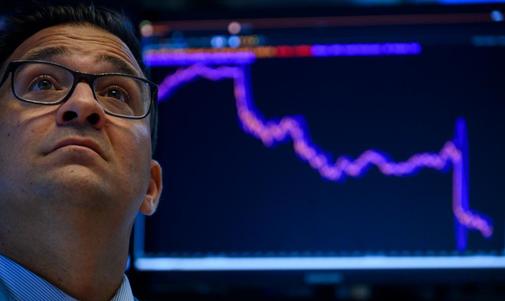- Fear: The US-China trade war plunges the Ibex to its annual minimum
- Timeline.USA vs. China: an increasingly worrisome trade war
- Currency: The devaluation of the yuan plunges Wall Street and the United States calls China "manipulator"
China wanted to give its currency a break yesterday, after the United States had pointed it out as a "currency manipulator" - a mean with no real consequences but with a high symbolic burden - and intervened in the market to stop the fall of the yuan, which Monday had dropped below the psychological barrier of 7 units per dollar, a level that had not reached for 11 years. What he did do was respond to Donald Trump ahead of his new tariffs - announced from September - and vetoing the purchase of any American agricultural product . He also sent a message: his commercial battle will have consequences in the global economy.
With that attitude, Beijing wanted to make it clear that at the moment it will not carry out a major escalation in the commercial war unleashed by the Government of Donald Trump, at least in the field of foreign exchange, but that it will not be taken either. The Ministry of Commerce of the Asian country revealed that not only have the purchases of US agricultural products by Chinese companies been suspended, but it does not rule out applying more taxes on the importation of goods of this type acquired after August 3.
The institution of the Asian giant lamented the tariff increase and announced Friday by the US and considered it "a serious violation" of the commercial truce agreed in June by Trump and his Chinese counterpart, Xi Jinping. In addition, the White House tenant was reminded of the "huge market capacity" that he has and "some bright prospects for the importation of high-quality American agricultural products,", Efe reports.
With the measures applied yesterday by the Chinese People's Bank to stabilize the yuan it was possible to give some calm to the markets - on Monday Wall Street suffered its biggest fall of the year - but the index of fear that has settled in them for fear was not dissipated that the commercial struggle between the two largest economies in the world can cause a massive restructuring of the supply chain and global financial flows and, perhaps, even a new recession.
The European stock exchanges tried to recover during the entire session of Monday's loss day, but the efforts had no effect. Shortly before closing, coinciding with the opening of Wall Street, all the parques of the Old Continent turned red and ended up intensifying their losses. The Ibex signed a fall of 0.89%, losing 8,700 basis points, and closing the day at its annual minimum.
But it was not the only one. The rest of European bags also turned red. Thus, the Dax in Frankfurt ended with a decrease of 0.61%, the Ftse 100 in London of 0.69%, while the Cac 40 in Paris experienced a slight drop of 0.02%. On the other side of the puddle, however, the indexes sought the rebound of the black session on Monday. At the close of this edition, the Dow Jones grew at levels above 1%.
On the other hand, Brent quality oil, a reference for the Old Continent, lost $ 60 per barrel, until trading at around $ 59.7, while the West Texas Intermediate (WTI) has stood at 54, 54 dollars
Time runs against the actors in the commercial war, and they seem to be aware. Beijing's reasons for restraint seem multiple. There is the political tension in Hong Kong, the main financial center of the country, which continues to live demonstrations in favor of democracy; there is the slowdown of the Chinese economy itself, as evidenced in, for example, the collapse of 14% of car sales so far this year; and there is the decision of the Chinese president, Xi Jinping, to celebrate 70 years of the triumph of communism in the country in October without a sense of political or economic crisis.
According to the criteria of The Trust Project
Know more- China
- Donald Trump
- U.S
- Paris
- Hong Kong
- popular Bank
Macroeconomics The devaluation of the yuan plunges Wall Street and the United States calls China "manipulator"
Defense Cold War between the United States and China
Macroeconomics The IMF cuts global growth due to the US-China trade war and Brexit

